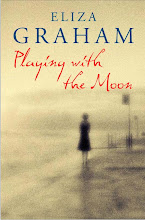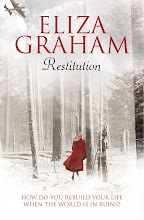Restitution--a new novel by Eliza Graham
"People are like rivers, they have no nationality but take on the nature of the terrain they pass through. No human spirit can be confined to a single state."
This is just one excerpt of the cleverly tailored new novel 'Restitution' by local author Eliza Graham
'Restitution' is the story of Alix, the aristocratic daughter of a German resistance fighter, who, in the wake of World War Two, is desperate to flee her home before the Red Army comes to revenge itself on Eastern Germany. On the last night in her own home she encounters unexpected visitors. By morning one is missing and one dead. Confused and afraid Alix finally runs for her own life. Although the war has ended, the fight for survival is only just beginning for Alix, and the mystery of that terrible night takes another sixty years to unfurl.
Although the storyline leaps back and forth through the many decades covered, this is carefully orchestrated leaving the reader enthusiastic for more. Overall, the story is written with an inherent intelligence and understanding, with unexpected surprises around every corner. The characters are three-dimensional and the storyline exudes the horrors and heroism in this tale of survival, love and betrayal.
Eliza has been working on this, her second novel, for some time, and has visited Pomerania, as part of her research. During the course of this she has studied many memoirs written by Polish and German civilians.
When asked what inspired Eliza to write this novel, her reply was, "A long time ago I had German friends who fled eastern Germany when the Russians came in. I'd always been intersted in that period of German history, the very end of the war and the period immediately after. I couldn't imagine what it would have been like to have grown up in a country that had been invaded from both sides and was (understandably) considered a pariah state and which had been reduced to rubble, in the case of many Germany cities. ALthough I could see why the Russians felt such hatred for the Germans, my response to Soviet treatment of German civilians was repulsion. I started wondering what it would be like to be a young girl coming of age in that period of history'.
'Restitution' by Eliza Graham was published by Macmillan in September 2008.
This is just one excerpt of the cleverly tailored new novel 'Restitution' by local author Eliza Graham
'Restitution' is the story of Alix, the aristocratic daughter of a German resistance fighter, who, in the wake of World War Two, is desperate to flee her home before the Red Army comes to revenge itself on Eastern Germany. On the last night in her own home she encounters unexpected visitors. By morning one is missing and one dead. Confused and afraid Alix finally runs for her own life. Although the war has ended, the fight for survival is only just beginning for Alix, and the mystery of that terrible night takes another sixty years to unfurl.
Although the storyline leaps back and forth through the many decades covered, this is carefully orchestrated leaving the reader enthusiastic for more. Overall, the story is written with an inherent intelligence and understanding, with unexpected surprises around every corner. The characters are three-dimensional and the storyline exudes the horrors and heroism in this tale of survival, love and betrayal.
Eliza has been working on this, her second novel, for some time, and has visited Pomerania, as part of her research. During the course of this she has studied many memoirs written by Polish and German civilians.
When asked what inspired Eliza to write this novel, her reply was, "A long time ago I had German friends who fled eastern Germany when the Russians came in. I'd always been intersted in that period of German history, the very end of the war and the period immediately after. I couldn't imagine what it would have been like to have grown up in a country that had been invaded from both sides and was (understandably) considered a pariah state and which had been reduced to rubble, in the case of many Germany cities. ALthough I could see why the Russians felt such hatred for the Germans, my response to Soviet treatment of German civilians was repulsion. I started wondering what it would be like to be a young girl coming of age in that period of history'.
'Restitution' by Eliza Graham was published by Macmillan in September 2008.


